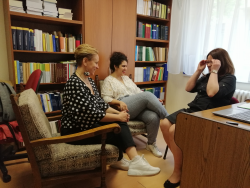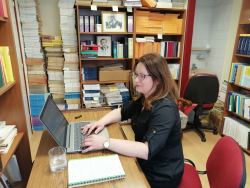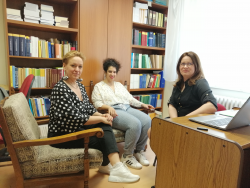Nemrégiben a Bűnügyi Tudományok Intézete vendégül látta Barbara Dudzik lengyel vendégkutatót és egyetemi adjunktust, aki a lublini Maria Curie- Skłodowska Egyetemről érkezett Szegedre. Barbara kutatásai jelenleg az európai bűnügyi együttműködésre fókuszálnak, szegedi tartózkodásának egyik fő célja volt, hogy megismerkedjen az ezzel kapcsolatos magyar tapasztalatokkal, különös tekintettel az Európai Nyomozási Határozatra. Mindezen felül lehetősége nyílt találkozni az intézeti kollégákkal, illetve előadásokat is tartott hallgatóknak, amelyekben szó volt a lengyel jogállamiság kérdéséről, illetve a nemrégiben nagy port kavart abortusszal kapcsolatos jogszabály-változásokról.
Barbara az itt tartózkodásával kapcsolatos tapasztalatairól a következőket mondta: „Nagyon élveztem az itt eltöltött időt. A város csodálatos, az emberek nagyon kedvesek és segítőkészek. A Szegedi Tudományegyetemen tett látogatásom minden kétséget kizáróan pozitívan fog hatni az egyetemi karrieremre.”
Az interjút készítette Hussein Jasmine doktorandusz hallgató.

1. Could you tell us a bit about yourself?
My name is Barbara Dudzik and I work as an assistant professor at the Department of Criminal Procedure of the Faculty of Law and Administration, Maria Curie - Skłodowska University in Lublin (Poland). I am an academic researcher and academic teacher. I deliver lectures for students, e.g. criminal procedure, european and international cooperation in criminal matters. I am also an undergraduate thesis supervisor for students of Internal Security and Criminology (UMCS, Lublin).
2. Which academic program did you use to come here and what is the purpose of your stay?
I received a Hungarian state scholarship for short-term study visit. It was awarded to me by the Tempus Public Foundation (TPF), based on the bilateral agreement between Poland and Hungary.
The main purpose of my stay in Szeged is to gather information about Hungarian experiences in the theory and the practice of applying the European Investigation Order (EIO). I’m collecting it by conducting a query in the library of the University and by participating in scientific meetings with the colleagues of the Institute. I also would like to know about the teaching methodology and the organisation of teaching activity at the Faculty of Law of the University of Szeged. The next aim of my stay here is to deliver a lecture for students about Polish criminal procedure.
3. Why did you choose our University/Institute?
I chose the University of Szeged for many reasons, but two of them seem to me to be crucial. Firstly, it is a reputable research center in Hungary. Secondly, the staff of the Institute of Criminal Sciences at the Faculty of Law of this university conduct advanced research in the field of European criminal law. Especially the scientific achievements of the Institute's director, Prof. Krisztina Karsai, should be highlighted. The possibility of conducting research under her direction is undoubtedly an opportunity to deepen my knowledge and experiences in comparative law research.

4. What is your research topic of your habilitation thesis?
One of my research areas is the European cooperation in criminal matters. Recently, I have focused on the European Investigation Order (EIO). It is a new instrument of the cooperation in criminal matters between EU Member States, regulated by Directive No. 2014/41/EU of the European Parliament and of the Council of 3 April 2014 on the European Investigation Order. It is the result of years of searching and unsuccessful attempts to effectively implement the collection and the transfer of evidence between EU Member States. So, I would like my habilitation thesis to be about the European Investigation Order.
5. Why did you decide to take a closer look on the Hungarian regulations in this research?
Hungary, as one of the first EU countries, transposed the directive and has been applying the EIO since 23 May 2017 (Poland has done it since 8 February 2018). New rules have always raised interpretative doubts (to a greater or lesser extent) at the beginning of their validity. I wanted to know what problems with EIO arose in Hungarian law and how they were resolved.
6. How did you enjoy your stay at our Institute, was it useful/helpful regarding your research?
I really enjoyed my stay in Szeged. The city is wonderful, the people are very nice and helpful. My visit at University of Szeged will undoubtedly have a positive impact on the development of my academic career. First of all, it enriched my international experience, which is necessary for the scientific development. The research carried out at the University of Szeged gave me the opportunity to exchange information and experience with Hungarian scholars. This allowed me to look at the EIO in a multi-faced, legal-comparative way.
I hope that my stay at the University of Szeged will be the beginning of a fruitful cooperation between the University of Szeged and my home Maria Curie – Skłodowska University in Lublin, which would result in the future a joint scientific and didactic cooperation. I also hope that our connection with researchers from the University of Szeged will be a good opportunity to mutually promote our countries and universities.
